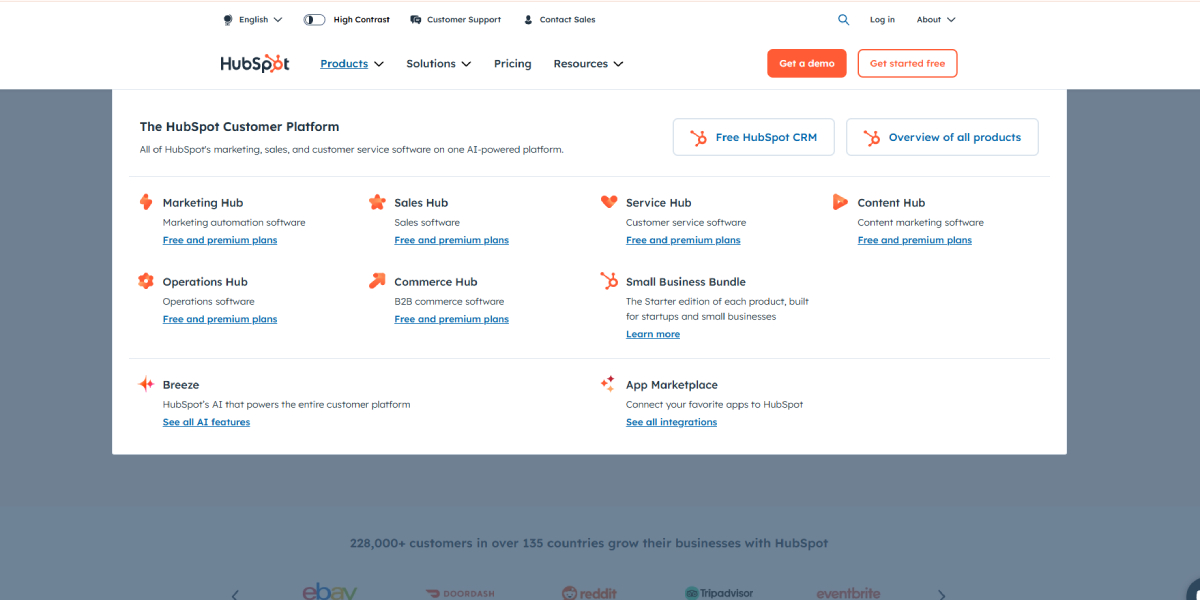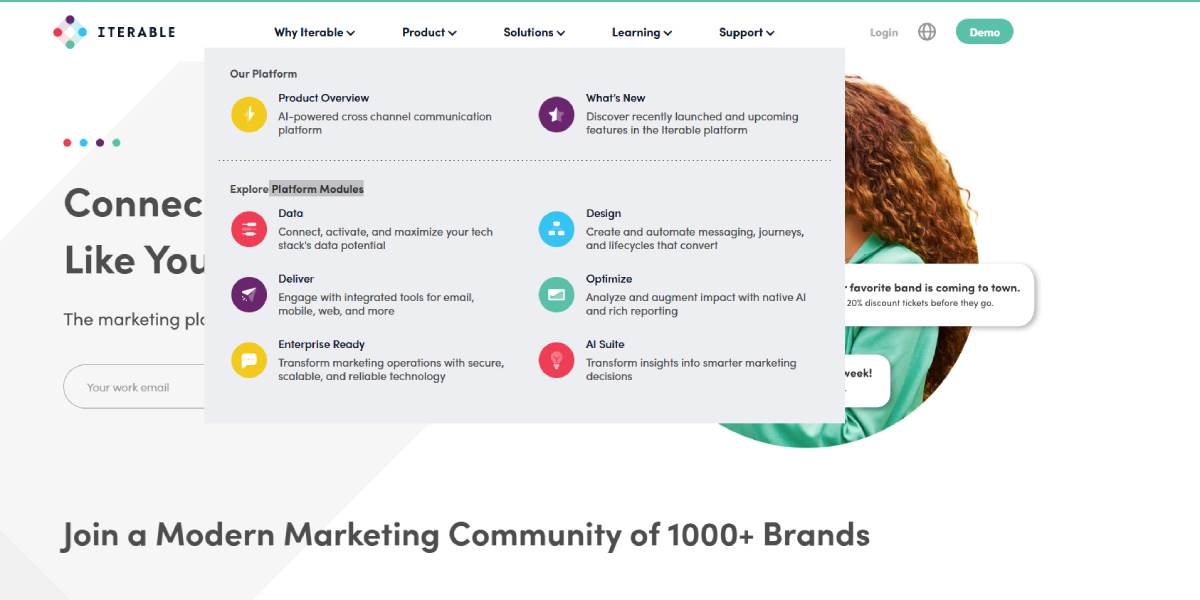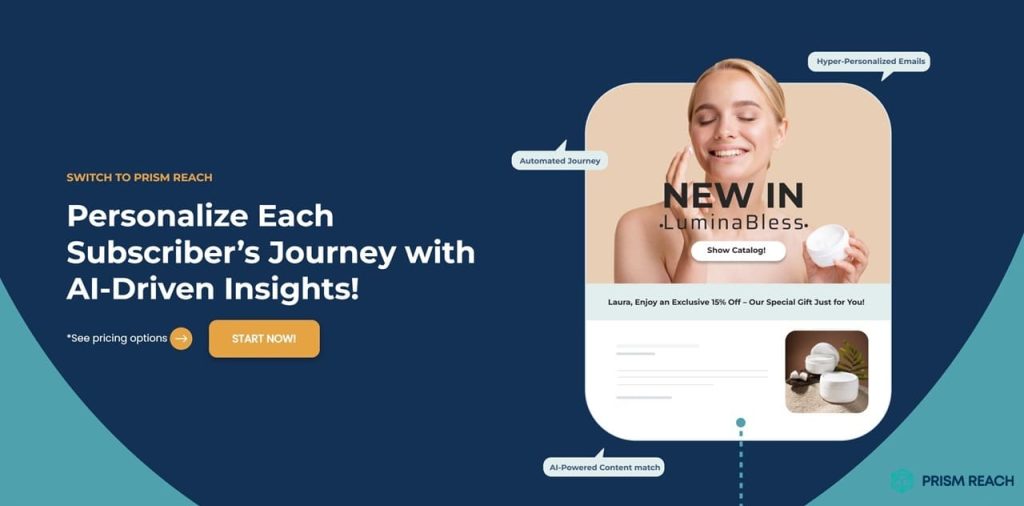In the ever-evolving landscape of digital marketing, email remains a cornerstone of customer engagement. As businesses seek to optimize their outreach strategies, the choice between email marketing platforms becomes crucial. Two giants in this arena, HubSpot and Iterable, offer robust solutions tailored to different business needs.
This comparison delves into the intricacies of HubSpot and Iterable, exploring their features, strengths, and ideal use cases. By understanding the nuances of these platforms, marketers can make informed decisions that align with their specific goals and organizational structures. Additionally, innovative solutions like Prism Reach are emerging to complement these platforms, offering specialized tools for deep personalization in email marketing.
Key Facts
- HubSpot excels as an all-in-one solution, integrating marketing, sales, and customer service tools.
- Iterable stands out for its advanced cross-channel capabilities and data-driven personalization.
- Both platforms offer robust email marketing features but cater to different business sizes and industries.
- Prism Reach is an AI-powered SaaS solution focused on enhancing email marketing through deep personalization, complementing the capabilities of HubSpot and Iterable.
- Prism Reach enhances both HubSpot and Iterable by offering sophisticated tools for content personalization and subscriber engagement.
HubSpot vs Iterable: A Tale of Two Approaches
Platform Philosophy and Core Features
HubSpot and Iterable represent two distinct philosophies in email marketing. HubSpot‘s approach is holistic, offering a comprehensive suite of tools that extend beyond email marketing. Its all-in-one platform integrates marketing, sales, and customer service tools, providing a unified solution for businesses. HubSpot’s strength lies in its ability to offer a seamless experience across various aspects of customer relationship management, from lead generation to customer retention. This integrated approach allows for better alignment between different departments and a more cohesive customer journey.
Iterable, on the other hand, focuses on delivering a specialized, data-driven email and cross-channel marketing experience. It excels in providing advanced cross-channel capabilities, particularly in areas like SMS, push notifications, and in-app messaging. Iterable’s platform is designed to handle complex, data-intensive campaigns, making it particularly suitable for businesses that require sophisticated, multi-channel marketing strategies. Its AI-powered optimization features, such as send-time optimization, give it an edge in maximizing engagement and conversion rates.


Feature Comparison
Both HubSpot and Iterable offer robust email marketing capabilities, including drag-and-drop editors and personalization features. However, they differ in their strengths and focus areas.
- HubSpot offers native CRM integration, providing a unified view of customer data across marketing, sales, and service functions. This integration allows for more cohesive customer interactions and data-driven decision-making.
- Iterable stands out with its advanced features in SMS, push notifications, and in-app messaging, enabling highly targeted and personalized marketing efforts across multiple channels.
- HubSpot provides a user-friendly interface that makes it accessible to marketers with varying levels of technical expertise, beneficial for smaller teams or businesses without dedicated technical resources.
- Iterable‘s workflow builder is noted for its intuitiveness, allowing marketers to create complex, multi-step campaigns with ease.
Ideal Use Cases
HubSpot is best suited for small to mid-sized B2B companies that value an integrated approach to marketing, sales, and customer service. Its comprehensive toolset allows businesses to manage various aspects of customer relationships from a single platform. This makes it particularly effective for companies looking to align their marketing and sales efforts, improve lead nurturing processes, and provide consistent customer experiences across different touchpoints.
Iterable, with its advanced personalization and cross-channel capabilities, is ideal for B2C companies, particularly in e-commerce, retail, and media industries. Its ability to handle complex data models and execute sophisticated, event-triggered campaigns makes it a powerful tool for businesses focused on data-driven marketing strategies. Iterable excels in scenarios where businesses need to manage large customer databases, implement highly targeted and personalized marketing campaigns, and engage customers across multiple digital channels.
Integration and Ecosystem
HubSpot‘s App Marketplace features numerous integrations, allowing businesses to connect with various third-party applications to extend functionality. This extensive ecosystem enables users to customize their HubSpot experience and integrate it seamlessly with other tools they may be using. The platform’s ability to connect marketing, sales, and customer service tools into a single platform enhances its value for businesses seeking a unified approach to customer relationship management.
Iterable also offers an extensive integration ecosystem, facilitating seamless data flow and enhancing marketing capabilities. Its API access provides robust options for custom integrations and data management, allowing businesses to tailor the platform to their specific needs. Iterable’s focus on data flexibility supports complex data models, enabling businesses to create sophisticated segments and tailor campaigns effectively.
Analytics and Reporting
HubSpot provides comprehensive reporting dashboards for marketing performance, offering detailed analytics for campaign performance, website traffic, and ROI. This data-driven approach facilitates informed decision-making across marketing and sales functions. The platform’s lead scoring capabilities are advanced and customizable, allowing businesses to prioritize prospects effectively.
Iterable offers in-depth analytics for campaign performance, with a focus on real-time data processing. This allows for immediate action based on user behavior and campaign results. The platform’s AI-powered features, such as send-time optimization, leverage machine learning to determine the optimal times to engage users, potentially improving open and conversion rates.
Integrating Hidden Gems into Your Strategy
To maximize the effectiveness of HubSpot or Iterable, integrating lesser-known strategies can provide significant advantages. Here are five hidden gems that can enhance your email marketing efforts:
- Utilize API for Custom Integrations: Leverage the APIs of both HubSpot and Iterable to create custom integrations tailored to your specific business needs. This enables automation of unique workflows that aren’t covered by standard integrations, enhancing operational efficiency.
- Implement Advanced Segmentation with Iterable: Use Iterable’s advanced segmentation features to create dynamic user segments based on real-time behavior and engagement metrics. This increases the relevance of your campaigns, leading to higher engagement rates and conversions.
- Cross-Platform Workflows: Create cross-platform workflows that trigger actions in Iterable based on events in HubSpot (and vice versa) using integration tools like Zapier. This streamlines processes and ensures timely communication across platforms, improving customer experience.
- Leverage AI-Powered Insights in Iterable: Use Iterable’s AI-driven insights to predict customer behavior and optimize send times for campaigns based on individual user data. This can lead to improved open rates and engagement by sending messages at optimal times for each recipient.
- Dynamic Content Personalization: Use dynamic content features in both platforms to tailor emails and landing pages based on user segments or behaviors observed in either system. This increases engagement by providing relevant content that resonates with individual users’ interests and behaviors.

Practical Tips for Maximizing Your Marketing Automation
To fully leverage the capabilities of HubSpot, Iterable, and Prism Reach, consider the following practical tips:
- Leverage AI-Powered Personalization: Use Prism Reach’s AI-driven content recommendations to enhance the personalization features in HubSpot and Iterable, ensuring that each subscriber receives content that resonates with their preferences.
- Optimize Send Times: Utilize Prism Reach’s predictive analytics to determine the optimal times to send newsletters, maximizing subscriber engagement and open rates.
- Automate Workflow Processes: Implement HubSpot’s comprehensive CRM integration or Iterable’s advanced workflow builder to automate complex workflows, reducing manual effort and ensuring timely communication with leads.
- Integrate Comprehensive Reporting: Combine the reporting capabilities of HubSpot or Iterable with Prism Reach’s detailed engagement metrics to gain a holistic view of campaign performance and make data-driven decisions.
- Enhance Lead Qualification: Use advanced lead scoring models in HubSpot alongside Prism Reach’s user avatars to prioritize high-potential leads, improving sales efficiency and conversion rates.
By integrating these tips into your marketing strategy, you can create a more cohesive and effective approach that leverages the strengths of each platform and tool, ultimately driving better results and higher ROI.
Innovative Solutions by Prism Reach
While HubSpot and Iterable offer robust solutions, the email marketing landscape is continually evolving. Prism Reach emerges as an innovative player in this space, offering AI-powered personalization that takes email marketing to the next level.
Benefits of Prism Reach:
- Increased Engagement: Publishers report up to 40% higher engagement rates due to the personalized nature of the content.
- Higher Revenue: Tailored advertising and efficient content targeting lead to higher monetization rates for published newsletters.
- Improved Productivity: Automation and AI-driven insights significantly reduce the time required to create and manage campaigns.
Prism Reach’s core functionality revolves around its proprietary AI technology, which clusters website content and social media posts into relevant categories. This AI uses a variety of data points to create detailed user avatars, enabling personalized newsletter content that incorporates factors such as location, engagement history, and predicted interests. The system’s ability to analyze vast amounts of data allows for highly targeted marketing strategies, complementing the broader automation capabilities of HubSpot and Iterable.
Upgrade Your Email Marketing with AI Personalization!
Conclusion
The choice between HubSpot and Iterable ultimately depends on your business’s specific needs, size, and industry focus. HubSpot offers a comprehensive, integrated solution ideal for businesses seeking to align their marketing, sales, and service efforts. Its comprehensive toolset supports small to mid-sized B2B companies in managing intricate marketing workflows effectively.
Iterable provides advanced cross-channel capabilities and data-driven personalization, catering to businesses with complex, multi-channel marketing needs. Its scalability and advanced features make it particularly suitable for larger enterprises or rapidly growing companies with sophisticated marketing requirements.
Additionally, innovative solutions like Prism Reach offer valuable enhancements to your email marketing efforts through deep personalization and AI-driven insights. By leveraging Prism Reach alongside HubSpot or Iterable, businesses can achieve higher engagement rates, increased revenue, and improved productivity.
Ultimately, the best choice depends on evaluating your specific business requirements, budget constraints, and long-term marketing goals. By carefully assessing these factors and exploring complementary tools like Prism Reach, you can build a marketing technology stack that best serves your unique needs and drives sustained growth.
Sources
- Integrate.io. (n.d.). HubSpot vs Iterable Overview. Retrieved from https://www.integrate.io/integrations/hubspot/iterable/
- GetCensus.com. (n.d.). HubSpot vs Iterable Comparison. Retrieved from https://www.getcensus.com/research-blog-listing/hubspot-vs-iterable-the-ultimate-marketing-automation-showdown
- Zapier.com. (n.d.). Integration Capabilities between HubSpot and Iterable. Retrieved from https://zapier.com/apps/hubspot/integrations/iterable
- SoftwareAdvice.com. (n.d.). Reviews and Features Comparison. Retrieved from https://www.softwareadvice.co.nz/software/138634/iterable
- Marketing Automation Insider. (n.d.). HubSpot vs Iterable: Pros, Cons, Pricing & Ratings (2023). Retrieved from https://www.marketingautomationinsider.com/hubspot-vs-iterable/